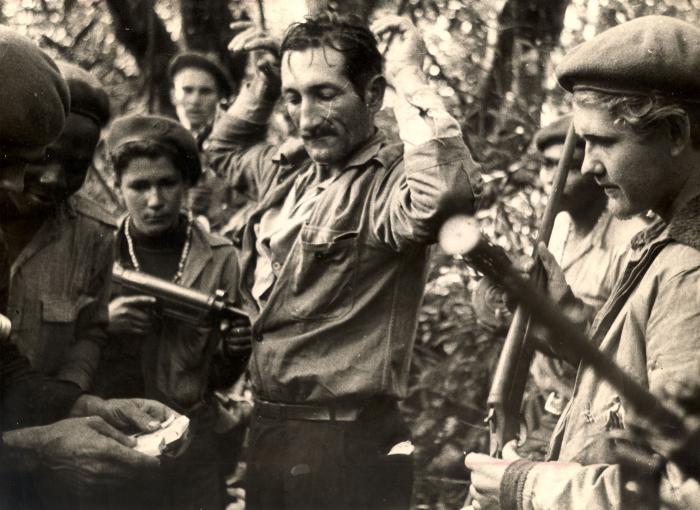
Some years later, in the line of a firing squad, the Toledo brothers had to review -each one by himself and in silence- many of the remote afternoons when their father took them to discover the secrets of the mountain.
There was nothing literary magic, but there was a great deal of contained rage in Maximiliano's very real story, when he recounted the death of Juan Bautista and Orestes, father and son machine-gunned at gunpoint before the eyes of his sister-in-law Genoveva and the six children of the family.
Pangüino Tardío, the bloodthirsty leader of a bandit gang in that area of the Escambray, had learned that Cheo, Juan's militiaman son, was passing through the small house of the El Palmar farm, in Cuatro Vientos, Topes de Collantes, and went to look for him with his whole gang.
With no other announcement than the barking of the dogs, around midnight they riddled the house from all four sides, but by "pure miracle" nobody was hurt. The insurgents demanded that Cheo come out, and Juan shouted that he was no longer there, that he had left in the afternoon, and that they should not shoot anymore, because of the children.
Pangüino shouted at them to go out to the drying shed, and ordered the two men to separate, because Orestes was already a man, even though he was 18, more of a man than all his murderers put together. He had someone to be like, and he proved it in a single gesture that early morning of April 16, 1962.
You had to be brave to give the answer that Juan, the 65-year-old patriarch of the family, gave when the bandits told him that they were killing communists and sympathizers of Fidel. "Well, everyone here is a communist," Juan Bautista replied.
His pride wounded, the cowardly Pangüino shot him with a burst from his machine gun, and Orestes, 18 years old, jumped like a wild beast, but a shot in the chest left him mortally wounded, with his machete half out of its sheath.
In the terrible scene everyone was trembling. Of impotence the criminals, of fear Genoveva, who was taken with a gun to her head, to search the house, looking for weapons that were not there. On the way out they turned Juan's body over, searched it, and took the 700 pesos he had collected for the coffee harvest.
The children were terrified, except for the oldest, eight years old, who was trembling with rage, and went after the retreating leader: "You do that because my father and uncles are not here! The slap Pangüino gave him sent him rolling down the ravine next to the dryer. The criminal also told Genoveva to get out of there, because he would come back the next day and kill them all.
Maximiliano was harvesting sugar cane in Camagüey when he received the telegram: "Your father and brother have been seriously injured". But the truth is that they had been dead for 13 dawns, since that endless morning when Genoveva put up a lantern so that to the cold would not extinguish the light she had turned on Juan, right there in the dryer, where he still lay, riddled with bullets. In the shot little house, another candle projected Orestes’s inert shadow on the walls.
Maximiliano did not return to the sugarcane harvest. He joined his brother Cheo, the militiaman; and Adolfo, too, and Roger -the Granma journalist who heard and later wrote the details of the tragedy, recounted before the court that sued the U.S. government for financing, through the CIA, hundreds of counterrevolutionary bands that killed 549 Cubans between 1961 and 1965 - tells that the three Toledo swore not to leave the Limpia del Escambray until the last bandit, especially the murderer of his father and brother, was finished.
They did so, until the day they had Pangüino Tardío in front of their guns, after he had been judged and condemned by the Cuban justice system, although not even with his death he did not pay for all the terror he had sown.
But the U.S. government wants to say that Cuba is a sponsor of terrorism, and for many years they say it is, and then they say it is not, for a few days, and then they say it is again. Are we the terrorists?
Source: Granma newspaper archive








